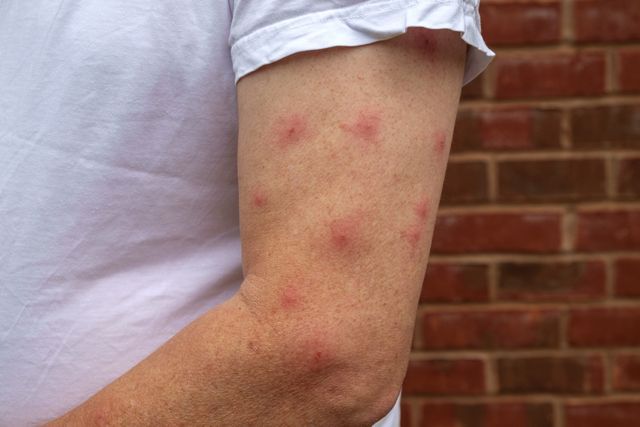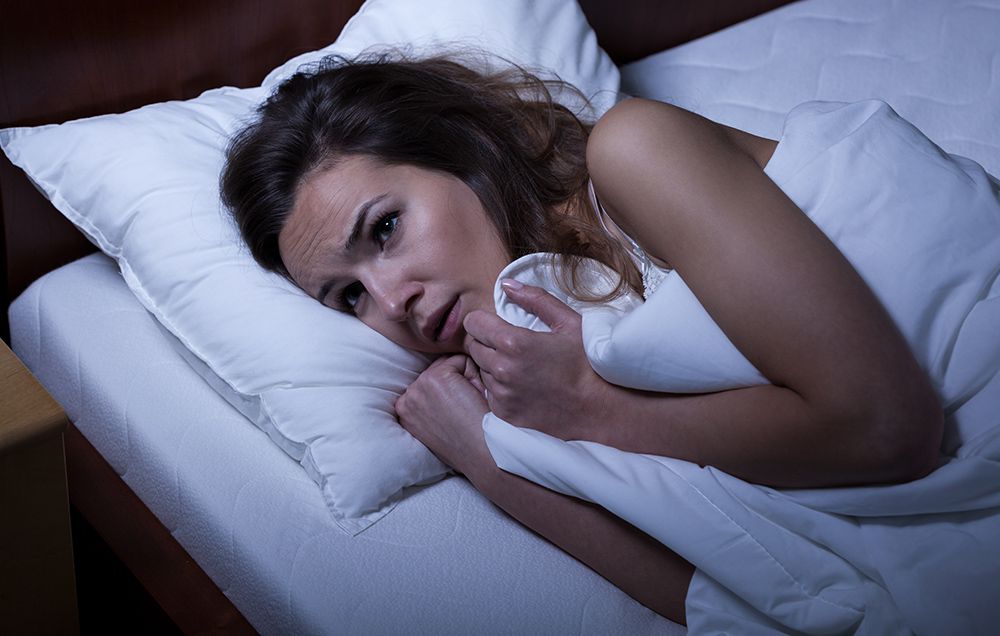Bug bites are an unfortunate little annoyance in life, and the odds are prettttttyyyy high that you’ve been bitten by some creepy-crawly (er, or a variety of creepy-crawlies) in your lifetime. And while you probably just want to scratch the darn spot and move on, it’s wise to try and figure out what actually bit you.
Why? Some bug bites are relatively harmless, but others have the potential to bring on more serious health issues if you don’t treat them appropriately, and fast. Here are several fairly common insect bites you may experience, and how to know whether or not a bite warrants a trip to your doctor’s office.
Bedbug bites
While the thought of bedbug bites may skeeve you out, they’re more annoying to deal with than an actual threat to your health, according to the Centers for Disease Control and Prevention (CDC). Bedbug bites are primarily just super itchy and can keep you up at night. The bigger issue with these pesky bugs is that they can spread really fast and lead to an infestation, and it can be an inconvenient and expensive process to get rid of one. (Also, the idea of little bugs feeding on your blood while you sleep isn’t exactly a comforting thought.)
People can have a range of reactions to bedbug bites, says Nancy Troyano, PhD, a board-certified entomologist with Ehrlich Pest Control. Some people have no reaction at all when bitten, but most people will notice an itchy, red, welt-like mark that looks similar to a mosquito bite, Troyano says. “Bites may appear in a linear fashion if there are multiple bugs feeding, and bites can occur anywhere, but they are often found in areas where skin is readily exposed,” she notes.
https://www.instagram.com/p/BVBLd_CF87U/
Bed Bug Identification: Bed bug before and after a blood meal It is critical to have suspected bed bug specimens properly identified by an expert. Call Round the Clock Pest Control. #bedbugstreatment,#bedbugbite,#bedbugspictures,#bedbugssymptoms,#bedbugsspray,#bedbugssigns,#bedbugsbitespictures,#wheredobedbugscomefrom,#whatchemicalkillsbedbugs,#howtogetridofbedbugsfast,#howtogetridofbedbugsbites,#howtogetridofbedbugsnaturally,#howtogetridofbedbugsyourself,#howtogetridofbedbugsinamattress,#howtogetridofbedbugsforgood
A post shared byRound The Clock Pest Control (@round_the_clock_pest_control) on
Contrary to popular belief, attracting bedbugs has nothing to do with bad hygiene or a dirty apartment. Bedbugs get around by hitchhiking onto your things, so prevention can be tough, says Angela Tucker, PhD, manager of technical services for Terminix. “Knowing this, the best prevention for bedbugs is being watchful during your travels and regular home cleaning,” she says.
You can also keep an eye out for the critters, which are about the size, shape, and color of an apple seed when fully grown. Another sign that bedbugs may be around your space is their byproduct, meaning you might see reddish-brown blood spots on sheets or mattresses, Tucker says.
If you do happen to get bedbug bites, spot-treat them with hydrocortisone cream to try to soothe itch, says David Cutler, MD, a family medicine physician at Providence Saint John’s Health Center in Santa Monica, California. Then, get rid of the infestation—with the help of a professional. “It’s important to see where the bed bugs came from,” Dr. Cutler says. “Then, call in a professional exterminator so you don’t get any more bed bug bites.”
Bee and wasp stings
You’ll usually know it when you get stung by a bee or wasp, because it hurts like hell. “At first, you may not even see anything on the skin,” Troyano says. “However, within a few minutes of being stung, there may be localized swelling and redness around the sting site.” The area might also feel warm, and you might see a small white mark near the center of the swelling (that’s where the stinger went into your skin), she describes.
https://www.instagram.com/p/BwrPwBQng7U/
Well, we knew it had to happen sooner or later. My first bee sting since discovering my severe allergy last spring.I’ve been receiving shots of bee venom regularly since September and am up to the highest potency. We were wondering/afraid of how my body would react to being stung, and although it HURT, swelled, and welted up, it paled in comparison to what I previously experienced. Yay, allergy shots!
A post shared byLet It Bee Honey (@letitbeecincy) on
If you know you have an allergy to bee or wasp stings, follow instructions from your doctor and seek medical care immediately. But if you’re not allergic, you’ll still want to take action. Bees lose their stinger after stinging, Troyano says, and you should try to remove it if it’s still stuck in you. Then, apply ice to reduce swelling, says David Gatz, MD, an emergency medicine physician at Mercy Medical Center in Baltimore. You also may want to take an antihistamine like Benadryl, he says.
The only real way to totally avoid getting stung is to not interact with bees and wasps…obviously. (But that’s not a feasible lifestyle if you ever want to enjoy the outdoors!) So when you’re outside, don’t swat at bees and wasps—just let them be. “In general, if you leave bees and wasps alone, they will leave you alone,” says Tucker.
If you want to be especially cautious, she also recommends skipping flowery perfumes or fragrances and covering any food and drink around you.
Scabies
Scabies is a parasite infestation caused by microscopic mites, according to the CDC. When you have scabies, the female burrows into your epidermis to lay her eggs.
Scabies usually shows up as a rash with small, raised pustules or blisters, and is “intensely itchy,” Troyano says. If you’ve never had scabies before, you might not see the rash for several weeks after you’ve been exposed. But, if you’ve had scabies before, you might see a rash within one to four days of being exposed, she says.
Scabies is transmitted through “prolonged direct skin contact” and is “highly contagious,” Tucker says. You need to see a doctor to get properly diagnosed and treated, but it’s generally treated with permethrin anti-parasitic cream, Dr. Gatz says.
Mosquito bites
Okay, yes, mosquito bites are usually NBD. They’re itchy and annoying, but nothing major to worry about. You probably already know what a mosquito bite looks like, but (just in case), they’re usually red, create a bump on your skin, and can itch, per Troyano. For some people, a bug bite may appear filled with fluid, with a small water blister in the center.

Mosquitos can carry diseases like Zika virus and West Nile virus, which can cause fever-like symptoms, rash, joint pain, and red eyes, the CDC says. So if you’ve been bitten by a mosquito and start to feel off afterward and have symptoms like these, call your doctor ASAP.
In order to let mosquito bites heal, do your best not to scratch; that raises the risk that the bite will get infected, Dr. Cutler says. Hydrocortisone cream should help alleviate some of the itch, he says.
While you can only do so much to prevent mosquito bites, Tucker recommends removing standing water around your home or yard (mosquitoes can lay their eggs in these areas). And, if you’re planning to spend a lot of time outside, using a good mosquito repellent is key, she says.
Spider bites
Spider bites are actually pretty rare, Troyano says, but they happen. They can look like typical bug bites, so it can be hard to tell right away if you were bitten by a spider unless you see it scuttling away.
If you do notice a bite and spot the little guy, Dr. Cutler recommends washing the area with soap and water and leaving it alone. “Toxins from the spider can destroy the skin,” he says—so it never hurts to wash the spot with soap and water to cleanse the skin (even if you’re not 100 percent sure it’s a spider bite).
But if the wound area seems to be growing, is unusually red, is hot to the touch, is ulcerated, or you have a fever and/or joint pain, call your doctor ASAP, Troyano says.
https://www.instagram.com/p/BeeQxz1lM3a/
Bitten by a spider yesterday… woke up this morning with no super powers 😢 #disappointed #damnaustralianwildlife #spiderbite #wantedsuperpowers #handyfortheopen #justleftwithitchingsoresinstead #doh
A post shared byHelen Harding (@hchharding) on
Cleaning out cobwebs inside and outside of your house can lessen your chances of spider run-ins. Also, wear long sleeves, pants, gloves, and a hat to protect your skin when you’re working outside or in areas where things are stored and not used often, and try to keep your grass and bushes maintained, Tucker says.
Tick bites
It’s not always obvious when a tick bites you, because it won’t *always* leave a mark (more on that in a minute). But sometimes the tick will still be attached when you discover a bite, so the first thing you’ll want to do is remove it. Troyano recommends taking the following steps to do this:
- Use tweezers and grab the tick close to the skin.
- Steadily pull upward, but avoid twisting the insect.
- Don’t crush the tick once removed.
- Submerge the tick in rubbing alcohol and save it. Put it in a clear, sealable plastic bag in case you need to see a doctor or veterinarian. Or, take a clear photo, then flush it.
Once the tick is removed, wash the area with soap and water, Dr. Gatz says.
If you notice a bullseye-shaped rash appear on your body, a pink rash on your wrists, arms, and ankles, or an ulcerated area around a bite, call your doctor, Troyano says. These symptoms may be signs that a tick did bite you, and you’ve been infected with a tick-borne illness like Lyme disease. If you experience a fever, chills, aches, and muscle fatigue, those are also cues you need to make a visit to your doctor.
But remember, not every tick carries a tick-borne illness, so even if one bit you at some point, that doesn’t guarantee you contracted something more serious.
https://www.instagram.com/p/BxIehRpFOWt/
Guess who got bit by a tick sat and now has to be on three weeks of antibiotics … 😒😑 atleast it’s me and not Atlas 😞 also side not I’m exhausted #tick #tickbite #lymes #ticksaredicks #sorry #exausted #killerheadache #imsureitsnothing
A post shared byPepperNappo (@peppernappo) on
How can you protect yourself from tick bites? Tucker recommends showering quickly when you come in from being outside (you might be able to wash off ticks before they have a chance to bite you). It’s also a smart idea to wear long pants and sleeves when you go into tick-infested areas, like the woods, and to wear bug repellent that contains DEET. Also ask a family member or friend to help you do a body scan for ticks after being out in the woods.
Source: Read Full Article
